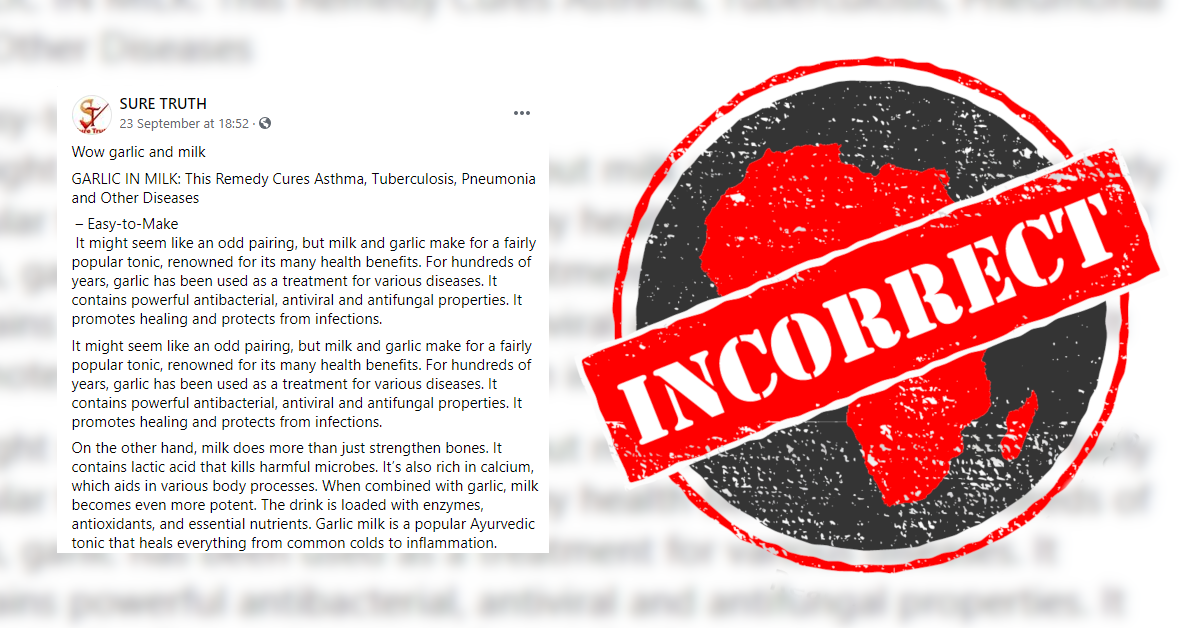“GARLIC IN MILK: This Remedy Cures Asthma, Tuberculosis, Pneumonia and Other Diseases,” claims a message posted on Facebook in Nigeria in September 2020.
“It might seem like an odd pairing, but milk and garlic make for a fairly popular tonic, renowned for its many health benefits,” it reads. “For hundreds of years, garlic has been used as a treatment for various diseases. It contains powerful antibacterial, antiviral and antifungal properties. It promotes healing and protects from infections.”
The message goes on to give instructions for preparing the remedy, which it claims is also an effective treatment for cough, cardiac problems, jaundice, arthritis and more. But does a mixture of garlic and milk really cure all these conditions?

“I advise people to ignore the claim,” Arthur Chuemere, professor of human physiology at the University of Port Harcourt’s faculty of basic medical sciences, told Africa Check.
“Garlic and milk does not have an impact on asthma symptoms, pneumonia, cough and tuberculosis. It also is not a treatment for cardiac problems or arthritis.”
Dr Rotimi Adesanya, a family physician and primary care paediatrician, also said the claim should be ignored as the remedy hasn’t been scientifically proven.
“In all the studies on jaundice, the substance garlic is not in any way relevant in the pathway,” he added. – Motunrayo Joel
“It might seem like an odd pairing, but milk and garlic make for a fairly popular tonic, renowned for its many health benefits,” it reads. “For hundreds of years, garlic has been used as a treatment for various diseases. It contains powerful antibacterial, antiviral and antifungal properties. It promotes healing and protects from infections.”
The message goes on to give instructions for preparing the remedy, which it claims is also an effective treatment for cough, cardiac problems, jaundice, arthritis and more. But does a mixture of garlic and milk really cure all these conditions?

‘No impact on symptoms’
“I advise people to ignore the claim,” Arthur Chuemere, professor of human physiology at the University of Port Harcourt’s faculty of basic medical sciences, told Africa Check.
“Garlic and milk does not have an impact on asthma symptoms, pneumonia, cough and tuberculosis. It also is not a treatment for cardiac problems or arthritis.”
Dr Rotimi Adesanya, a family physician and primary care paediatrician, also said the claim should be ignored as the remedy hasn’t been scientifically proven.
“In all the studies on jaundice, the substance garlic is not in any way relevant in the pathway,” he added. – Motunrayo Joel
Republish our content for free
For publishers: what to do if your post is rated false
A fact-checker has rated your Facebook or Instagram post as “false”, “altered”, “partly false” or “missing context”. This could have serious consequences. What do you do?
Click on our guide for the steps you should follow.
Publishers guideAfrica Check teams up with Facebook
Africa Check is a partner in Meta's third-party fact-checking programme to help stop the spread of false information on social media.
The content we rate as “false” will be downgraded on Facebook and Instagram. This means fewer people will see it.
You can also help identify false information on Facebook. This guide explains how.





Add new comment